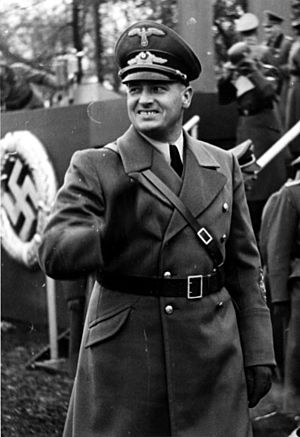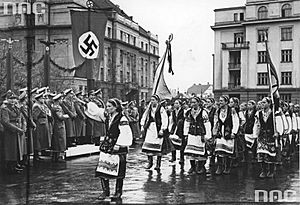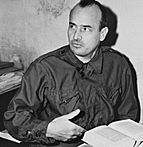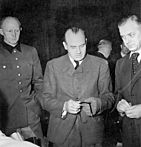Hans Frank facts for kids
Quick facts for kids
Hans Frank
Reichsleiter
|
|
|---|---|
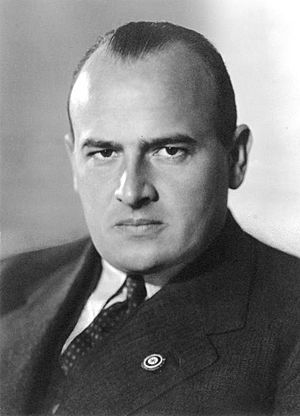
Frank in 1939
|
|
| Governor-General of the General Government of Occupied Poland | |
| In office 26 October 1939 – 19 January 1945 |
|
| Preceded by | Office established |
| Succeeded by | Office abolished |
| Reichsminister without portfolio | |
| In office 19 December 1934 – 30 April 1945 |
|
| Chancellor | Adolf Hitler |
| President of the Academy for German Law | |
| In office 2 October 1933 – 20 August 1942 |
|
| Preceded by | Office established |
| Succeeded by | Otto Georg Thierack |
| Personal details | |
| Born |
Hans Michael Frank
23 May 1900 Karlsruhe, Grand Duchy of Baden, German Empire |
| Died | 16 October 1946 (aged 46) Nuremberg Prison, Nuremberg, Allied-occupied Germany |
| Cause of death | Execution by hanging |
| Political party | Nazi Party |
| Other political affiliations |
German Workers' Party (DAP) |
| Spouse |
Brigitte Herbst
(m. 1925) |
| Children | 5, including Niklas |
| Alma mater | University of Kiel |
| Profession | Lawyer |
| Signature |  |
| Military service | |
| Allegiance | |
| Branch/service | Imperial German Army |
| Battles/wars | World War I |
| Criminal conviction | |
| Criminal status | Executed |
| Conviction(s) | War crimes Crimes against humanity |
| Trial | Nuremberg trials |
| Criminal penalty | Death |
| Details | |
|
Span of crimes
|
8 October 1939 – 19 January 1945 |
| Target(s) | Polish civilians Polish Jews |
Hans Michael Frank (born May 23, 1900 – died October 16, 1946) was a German politician and lawyer. He played a major role in Nazi Germany during World War II. He was the head of the General Government in Nazi-occupied Poland.
Frank was an early member of the German Workers' Party (DAP). This group later became the Nazi Party (NSDAP). He was involved in the failed Beer Hall Putsch, an attempt to take over the government. Later, he became Adolf Hitler's personal legal advisor. He also served as the lawyer for the Nazi Party.
In 1939, after Germany invaded Poland, Frank was made Governor-General of the occupied Polish lands. During his time in charge, he was very harsh to the people living there. He was directly involved in the mass murder of Jewish people. He also used forced labor and oversaw four of the extermination camps. Over 4 million people died under his rule.
After the war, Frank was found guilty of war crimes and crimes against humanity at the Nuremberg trials. He was sentenced to death and executed by hanging in October 1946.
Contents
Hans Frank's Early Life
Hans Frank was born in Karlsruhe, Germany. He was the middle child of three. His father, Karl, was a lawyer. His mother was Magdalena Buchmaier.
He finished high school in Munich. When he was 17, he joined the German Army during World War I. However, he did not fight on the front lines.
After the war, Frank studied law and economics. He attended the University of Munich and the University of Kiel. He earned his law degree in 1924.
Between 1919 and 1920, he was part of the Thule Society. This was a group with strong German nationalist ideas. He also joined the Freikorps, a volunteer military group. He helped stop a communist uprising in Munich. In 1919, he joined the German Workers' Party (DAP).
Hans Frank's Nazi Party Career
The DAP soon became the Nazi Party (NSDAP). Frank officially joined the Nazi Party in October 1923. In November of that year, he took part in the "Beer Hall Putsch." This was a failed attempt by Hitler and his followers to seize power. After the failed coup, Frank fled to Austria. He returned to Munich in 1924.
Frank became Adolf Hitler's personal legal advisor. As the Nazis gained power, Frank also served as the party's lawyer. He handled many legal cases for them.
In October 1928, Frank started the National Socialist German Jurists Association. He became its leader. In October 1930, he was elected to the Reichstag, which was the German parliament.
In April 1933, he became the Minister of Justice for Bavaria. In December 1934, he was named a Reichsminister (Reich Minister) in the German government. In June 1933, he was made a Reichsleiter. This was the second-highest political rank in the Nazi Party. He was in charge of the party's legal matters.
On June 26, 1933, Frank founded the Academy for German Law. He was its leader and later its President. He held this position until 1942. Frank also served as a judge on the Supreme Party Court.
Frank sometimes disagreed with extreme actions. He spoke out against killings that happened outside the law. This included events at the Dachau concentration camp and during the "Night of the Long Knives." He believed such actions weakened the legal system.
Governor-General in Poland
In September 1939, after Germany invaded Poland, Hans Frank was put in charge of the occupied Polish territories. This area was called the General Government. It was a part of Poland not directly made part of Germany.
Frank was responsible for separating Jewish people into crowded areas called ghettos. Jewish people faced terrible discrimination and received very little food. He oversaw the huge Warsaw ghetto. He also forced Polish civilians to work as forced laborers.
In 1942, Frank lost some of his power outside the General Government. This happened after he made speeches that annoyed Hitler. He also had conflicts with other Nazi officials.
An attempt to assassinate Frank happened on January 29, 1944. Polish resistance fighters tried to derail his train near Kraków. The train was damaged, but no one was killed. As punishment, about 100 Polish hostages were executed.
Extermination Camps
Hans Frank played a part in the policies that led to the mass murder of people in Poland. Under his leadership, mass murder became a planned action. The General Government was where four of the six main extermination camps were located. These were Bełżec, Treblinka, Majdanek, and Sobibór. Two others, Chełmno and Birkenau, were just outside the General Government's borders.
Frank later claimed he did not know about the extermination camps until 1944. He said the extermination of Jews was controlled by Heinrich Himmler and the SS. However, the Nuremberg tribunal found this claim to be untrue. Frank fled the General Government in January 1945 as the Soviet Army advanced.
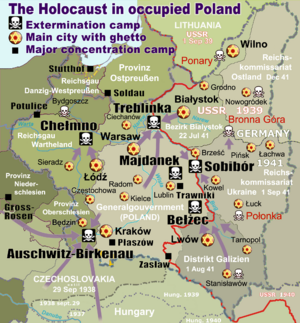
Capture and Trial
American troops captured Hans Frank on May 4, 1945. This happened in Tegernsee, southern Bavaria. He was charged with war crimes. He was tried before the International Military Tribunal in Nuremberg. The trial lasted from November 20, 1945, to October 1, 1946.
During the trial, Frank converted to Roman Catholicism. He said he had religious experiences. He willingly gave 43 volumes of his personal diaries to the Allies. These diaries were used as evidence against him.
Frank and Albert Speer were the only defendants who showed some regret for their actions. Frank was found guilty of war crimes and crimes against humanity on October 1, 1946. He was sentenced to death by hanging. The execution took place at Nuremberg Prison on October 16, 1946.
When asked for a final statement, he said, "I am thankful for the kind treatment during my captivity and I ask God to accept me with mercy." His body was cremated, and his ashes were scattered in the Isar river.
Hans Frank's Family
On April 2, 1925, Hans Frank married Brigitte Herbst. She was a 29-year-old secretary. They got married in Munich. They had five children:
- Sigrid Frank (born 1927)
- Norman Frank (born 1928 – died 2010)
- Brigitte Frank (born 1935 – died 1981)
- Michael Frank (born 1937 – died 1990)
- Niklas Frank (born 1939)
Brigitte Herbst was known for being stronger-willed than her husband. After 1939, she called herself "a queen of Poland." Their marriage was not happy.
In 1987, his son, Niklas Frank, wrote a book about his father. It was called Der Vater: Eine Abrechnung (The Father: A Settling of Accounts). The book was very critical of Hans Frank. Niklas questioned his father's remorse before his execution.
Niklas is the only living child of Hans and Brigitte Frank. Sigrid remained a strong Nazi supporter. She moved to South Africa during the apartheid era and died there.
Awards and Decorations
- Nuremberg Party Day Badge, 1929
- Golden Party Badge, 1933
- Blood Order #532, 1934
- Grand Cross of the Order of Saints Maurice and Lazarus, 1936
- Danzig Cross 1st Class, 1940
- War Merit Cross 2nd Class and 1st Class without Swords, 1940
- NSDAP Long Service Award in Gold, Silver and Bronze
See also
 In Spanish: Hans Frank para niños
In Spanish: Hans Frank para niños
- Command responsibility
- German war crimes
- Glossary of Nazi Germany
- List of Nazi Party leaders and officials
- Nazi crimes against the Polish nation
- Nuremberg trials
- Nuremberg Trials bibliography
- The Holocaust in Poland
- Holocaust (miniseries) – TV production in which Frank is portrayed
 | Victor J. Glover |
 | Yvonne Cagle |
 | Jeanette Epps |
 | Bernard A. Harris Jr. |


